Pennsylvania
 From Conservapedia
From Conservapedia | Capital | Harrisburg |
|---|---|
| Nickname | The Keystone State |
| Official Language | None |
| Governor | Tom Wolf, D |
| Senator | Bob Casey, Jr., D (202) 224-6324 Contact |
| Senator | John Fetterman, D (202) 224-4254 [] |
| Population | 12,815,000 (2020) |
| Ratification of Constitution/or statehood | December 12, 1787 (2nd) |

|
Motto: "Virtue, Liberty, and Independence" |
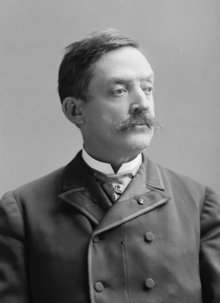
Pennsylvania, which means "Penn's woods" or "Penn's land," was one of the original thirteen colonies in the United States. Its capital is Harrisburg and it borders Ohio, Maryland, New York, New Jersey, Delaware, and West Virginia. For two decades Pennsylvania repeatedly voted for the Democrat candidate for president, but in 2016 Republican Donald Trump carried the state by 44,000 votes with his message of "Make America Great Again" along with his criticism of free trade and illegal immigration. In 2020, Trump won by a landslide among in-person voters, but 2.6 million mailed-in votes without the statutorily required signature verification was counted in favor of Biden, and he was declared the winner in a disputed outcome.
In 2022, Pennsylvania is a battleground state for control of the U.S. Senate, as Trump-endorsed Republican Dr. Oz faces off against Leftist Dem John Fetterman for the seat held by retiring Republican Pat Toomey.
The state Constitution of Pennsylvania, like all of the other 50 states, acknowledges God or our Creator or the Sovereign Ruler of the Universe. It says:
- WE, the people of the Commonwealth of Pennsylvania, grateful to Almighty God for the blessings of civil and religious liberty, and humbly invoking His guidance, do ordain and establish this Constitution.
Contents
- 1 Politics
- 1.1 Elected Officials
- 1.2 2020 election fraud
- 1.2.1 Ignoring mail-in ballot safeguards
- 1.2.2 Confusing guidance
- 1.2.3 Trashed Trump military ballots
- 1.2.4 Extra ballots
- 1.2.5 Unsecured voting
- 1.2.6 New Jersey voters
- 1.2.7 Changing votes for Trump
- 1.2.8 Mis-addressed ballots
- 1.2.9 Naked ballots in Philadelphia
- 1.2.10 682,770 estimated ballots processed with no observers
- 2 Major cities
- 3 History
- 4 Miscellaneous
- 5 Sports
- 6 Name
- 7 Further reading
- 8 See also
- 9 External link
- 10 References
Politics[edit]
Pennsylvania is a purple state, it voted Democrat in presidential elections since 1992. It swung to red in 2016 when Donald Trump won. The Pennsylvania State Senate consists of 30 Republicans and 20 Democrats. The State House has 112 Republicans and 90 Democrats. Republicans also have a 12-7 edge in Pennsylvania's federal House delegation.
Elected Officials[edit]
Statewide[edit]
- See also: Democrat election fraud
- Governor Tom Wolf (D)
- Lt. Governor John Fetterman (D)
- Secretary of the Commonwealth Kathy Boockvar (D)
- Attorney General Josh Shapiro [D]
- Auditor General Timothy DeFoor [R]
- State Treasurer Stacy Garrity [R]
Federal[edit]
- Sen. Robert Casey, Jr. (D)
- Sen. Patrick Toomey (R)
- Rep. Brian Fitzpatrick [R, PA–01]
- Rep. Brendan Boyle [D, PA–02]
- Rep. Dwight Evans [D, PA–03]
- Rep. Madeleine Dean [D, PA–04]
- Rep. Mary Gay Scanlon [D, PA–05]
- Rep. Chrissy Houlahan [D, PA–06]
- Rep. Susan Wild [D, PA–07]
- Rep. Matt Cartwright [D, PA–08]
- Rep. Dan Meuser [R, PA–09]
- Rep. Scott Perry [R, PA–10]
- Rep. Lloyd Smucker [R, PA–11]
- Rep. Fred Keller [R, PA–12]
- Rep. John Joyce [R, PA–13]
- Rep. Guy Reschenthaler [R, PA–14]
- Rep. Glenn Thompson [R, PA–15]
- Rep. Mike Kelly [R, PA–16]
- Rep. Conor Lamb [D, PA–17]
- Rep. Michael F. Doyle [D, PA–18]
2020 election fraud[edit]
- See also: Pennsylvania election fraud and Biden Putsch
The Pennsylvania state legislature decided Election Day ends at 8 PM on November 3, 2020 election night. Rogue Democrat governor Tom Wolf circumvented the state legislature and took the fight to the state supreme court. The Pennsylvania Supreme Court created law out of thin air and extended the deadline for mail-in ballots to November 6. The case then was appealed to the U.S. Supreme Court.
Democrat operative Kathy Boockvar, who simultaneously was serving as Pennsylvania Secretary of Commonwealth in charge of elections, told the United States Supreme Court on October 28, 2020 that ballots received after 8 p.m. on November 3, 2020 would be segregated, but she changed the rules on November 1 and directed counties to canvass those ballots as soon as possible upon receipt. In some counties, it is not possible to both segregate and canvass ballots as directed. This directive leaves open the possibility that timely votes will be commingled with votes received after 8 p.m. on Election Day, despite the fact that these votes remain the subject of litigation before the United States Supreme Court.
The Department changed the rules again on November 2, 2020 when they provided last-second guidance directing counties to provide information to help voters whose mail-in or absentee ballots were incorrectly completed so those voters could vote on a provisional ballot. The late release of this “guidance” resulted in inconsistent application across the counties – some of whom contacted voters as directed and some who did not. There is no basis for this guidance in current law. The Secretary created this new process out of thin air.
At 8:38 p.m. on Monday, November 2 – less than 12 hours before the polls were to open – the Department issued an email to counties directing them to provide information to political party and candidate representatives regarding mail-in and absentee ballots which had been set aside because they failed to comply with the requirements of the Election Code in order to be counted, so that voters could come in and vote provisionally at the polls. The late release of this “guidance” resulted in inconsistent application across the counties, some of whom contacted voters as directed and some who did not; such differential treatment is wholly inappropriate and a direct result of Boockvar’s scattershot approach to Pennsylvania’s elections.[1][2]
Trump led by almost 800,000 votes on election night after most Americans headed to bed. Over the course of the next 72 hours, President Trump’s lead shrunk to less than a 95,000 vote lead in the keystone state, and then Joe Biden took the lead. Batches of votes started flowing into the final tally, mostly in favor of Joe Biden. Five Thirty Eight reported that “Two more batches of Pennsylvania vote were reported: 23,277 votes in Philadelphia, all for Biden."
The Pennsylvania Appeals Court issued an order that said
| “effective immediately … all candidates, watchers, or candidate representatives [shall] be permitted to be present for the canvassing process … and be permitted to observe all aspects of the canvassing process within 6 feet, while adhering to all COVID-19 protocols, including, wearing masks and maintaining social distancing.”[3] |
Philadelphia Democrat election officials refused to comply with the order,[4][5] and the Democrat Sheriff, a Biden supporter, refused to enforce the Appeals Court order.[6]
The Trump campaign then filed a lawsuit in federal district court claiming that the Board of Elections is “nonetheless continuing to count ballots, without any observations by any representatives or poll watchers of President Trump and the Republican Party.”[7]
115% of Pensylvania registered Democrats voted for Biden. Biden received 1.24 to 1.43 times greater than either Hillary Clinton or Barack Obama in predominant Republican counties.[8]
Another way to track fraudulent votes is to look closely at how many of the votes did little or no down-ticket voting. When manufacturing votes, it is too time consuming to vote for other officeholders.[9]
A lawsuit filed by the Public Interest Legal Foundation (PILF) alleges that there are at least 21,000 dead people on Pennsylvania’s voter rolls. The lawsuit claims that Pennsylvania failed to “reasonably maintain” their voter registration records under federal and state law in time for the 2020 presidential election. The lawsuit states:
| “As of October 7, 2020, at least 9,212 registrants have been dead for at least five years, at least 1,990 registrants have been dead for at least ten years, and at least 197 registrants have been dead for at least twenty years."[10] |
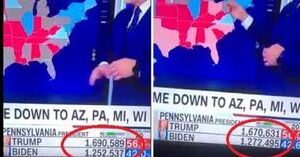
According to the lawsuit, about 92 percent of the 21,000 dead people on Pennsylvania’s voter rolls died sometime before October 2019. About 216 dead people show voting credits after federally listed dates of death in 2016 and 2018, the lawsuit alleges.
Republican candidates and officials also filed a lawsuit challenging Montgomery county officials’ decision to notify voters whose ballots are defective and giving them a chance to “cure” the defects—something not authorized under state law.failing to maintain accurate voter rolls and remove individuals who have died, moved out of state, or otherwise become ineligible to vote.[11]
Tyler O'Neil of PJMedia reported Boockvar was sued by the 2020 Trump campaign following massive allegations of widespread voter fraud after the 2020 Presidential election, accusing Boockvar and county elections boards throughout the state of violating the U.S. Constitution by unilaterally revising the law in a manner that deprives some voters of their rights to a free and fair election. The lawsuit brought no fewer than seven counts against Boockvar and the county election officials, claiming that they violated the Fourteenth Amendment to the Constitution and the Electors and Elections Clauses of Article I in the Constitution. In broad strokes, the lawsuit accuses the defendants of unilaterally making law on elections, depriving the legislature of its rights, and of denying voters and the Trump campaign equal protection under the law. [12]
| “In a rush to count mail ballots and ensure Democrat Joe Biden is elected, Pennsylvania has created an illegal two-tiered voting system for the 2020 General Election, devaluing in-person votes.”
“For voters that appeared at the polls, those citizens were required to sign voter registrations, have those signatures checked against voter rolls, vote in a polling place monitored by statutorily-authorized poll observers, and have their votes counted in a transparent and verifiable open and observed manner. By contrast, due to the arbitrary, unauthorized, and standardless actions of the Secretary of the Commonwealth of Pennsylvania, Kathy Boockvar, nearly 2.65 million votes were cast through a ‘mail-in’ process that lacked all of the hallmarks of transparency and verifiability that were present for in-person voters.” |
The Trump campaign and two Pennsylvania voters allege that Boockvar
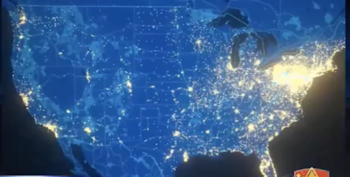
| “refused to require adequate verification of the voter’s identity. Rather than require votes to be received on the day of election, the Secretary permitted ballots received up to three days after the election to be counted without any evidence of timely mailing, such as a postmark. Finally, contrary to the in-person voting that is open and transparent to the parties and the candidates, Defendants permitted the review and counting of mail-in ballots largely in secret with no monitoring.”
“This two-track election system not only violates Plaintiffs’ rights guaranteed by the United States Constitution but also violates the structure of the Constitution that elections in the States must be carried out as directed by their respective legislatures.” |
The lawsuit seeks an emergency order preventing Pennsylvania from certifying the election results or one prohibiting the election officials from certifying any results
| “that include the tabulation of absentee and mail-in ballots which do not comply with the Election Code,” |
such as ballots counted while the Trump campaign’s watchers were prevented from observing or ballots that lack requirements of state law such as a secrecy envelope or a voter’s signed declaration. The lawsuit also seeks an injunction ordering election officials not to count ballots in cases where election officials contacted voters to give them an opportunity to “cure” improperly cast ballots.
This extraordinary legal action only makes sense given the numerous significant concerns the Trump campaign raises throughout the lawsuit. Boockvar and county election officials allegedly engaged in egregious discrimination and gave wanton preference to voters in Democratic-leaning counties over those in Republican-leaning counties.
Ignoring mail-in ballot safeguards[edit]
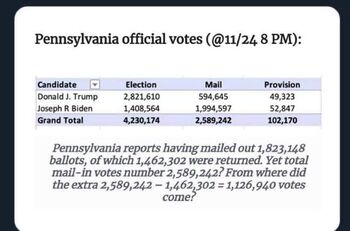
Boockvar and the county officials repeatedly ignored essential safeguards for absentee and mail-in voting which require “procedural safeguards to deter fraud and ensure transparency” due to “inherent risk.” In December 2019, Pennsylvania’s auditor general, Eugene DePasquale, determined that there are more than 50,000 cases of potentially inaccurate voter records in the state’s system.
On October 31, 2019, Pennsylvania’s legislature passed Act 77, which allowed all Pennsylvania voters the option of voting by mail without providing a reason or excuse. Yet mail-in voting still requires a ballot application and the election code still bars ballot harvesting except in the case of disabled voters. Pennsylvania law still requires ballots that have been filled out incompletely or incorrectly to be declared void and it does not permit election boards to give voters who cast improper ballots a “notice and opportunity to cure” those ballots.
Importantly, Act 77 prohibits a voter from casting both a mail-in ballot and an in-person ballot, unless the voter returns an unvoted mail-in ballot and declares that he or she has not voted by mail. The lawsuit alleged,
| “Defendants failed to take adequate measures to ensure that the provisions of the Election Code enacted to protect the validity of absentee or mail-in ballots, including without limitation Act 77, were followed.” |
Confusing guidance[edit]
On August 19, 2020, Secretary Boockvar sent all the 67 county election boards a guidance document claiming that the “naked ballots should be counted pursuant to the Pennsylvania Election Code.” (A ballot is considered “naked” if it is not returned in the secrecy envelope, as required by state law.)
On September 17, the Pennsylvania Supreme Court rejected that position, but Boockvar did not send follow-up guidance telling the election boards that they must not count naked mail-in ballots.
On September 11, Boockvar’s office sent the county officials another guidance regarding applications for mail-in ballots. That guidance did not mention the key fact that state law requires a voter to sign a mail-in ballot application, and the law requires officials to verify that signature before sending out a ballot.
The lawsuit claims the September 11 guidance forbade signature verification in vetting mail-in ballots and ballot applications. It also cites a September 28 guidance memo, in which Boockvar claimed that the “Election Code does not permit county election officials to reject applications or voted ballots based solely on signature analysis.” The lawsuit claimrf:
| “Despite the fact that well over a third of the votes were cast by mail, Secretary Boockvar and the Pennsylvania Department of State did not undertake any meaningful effort to prevent the casting of illegal or unreliable absentee or mail-in ballots and/or to ensure the application of uniform standards across the County Election Boards to prevent the casting of such illegal or unreliable ballots. Rather, Secretary Boockvar has exercised every opportunity to do quite the opposite.” |
Trashed Trump military ballots[edit]
Officials in Luzerne County found that a temporary seasonal election worker trashed nine military ballots received in unmarked envelopes, seven of which had been cast for President Trump.
Extra ballots[edit]
During the election, voters reported receiving mail-in ballots even though they did not apply for them. Many reported having received multiple mail-in ballots, some as many as four or five.
“Moreover, at the polling locations on Election Day, voters were informed that they must vote provisionally because they had applied for mail-in votes, even though those voters report that they neither applied for nor received mail-in ballots,” the lawsuit notes.
Some voters reported having received unsolicited mail-in ballots, but when they went to their in-person polling places, the poll books reflected that no mail-in ballot had been sent.
On the other hand, even though poll workers told voters that they were recorded as having already voted by mail, the workers let the voters cast ballots in person to be recorded on ballot machines.
Poll watchers reportedly observed poll workers mishandling spoiled mail-in or absentee ballots that should have been voided after the voters returned them in order to vote in-person instead.
Unsecured voting[edit]
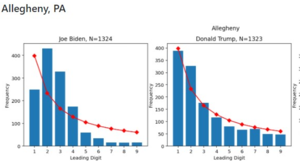
In Allegheny County, voters reported that poll workers watched voters cast provisional ballots in such a way that the poll worker could determine which candidate the voter had selected.
New Jersey voters[edit]
In Centre County, a poll worker reported that people who identified themselves as New Jersey voters — rather than Pennsylvania voters — were allowed to cast provisional ballots in person.
Changing votes for Trump[edit]
In Chester County, an observer claimed to have witnessed an election worker alter the results of unclear ballots. The worker dealt with over-voted and under-voted ballots — ballots that marked either zero candidates or multiple candidates for one or more offices. “The observer reports that in numerous instances the election worker altered the over-voted ballot by changing votes that had been marked for Donald J. Trump to another candidate.”
Mis-addressed ballots[edit]
The lawsuit claims that| “dozens of mail-in ballots were addressed to single addresses, each ballot being in a different name. Based on the carrier’s experience delivering mail to those addresses, the carrier is aware that the people whose names were on the ballots are not names of people who live at those addresses. In addition, ballots were mailed to vacant homes, vacation homes, empty lots, and to addresses that do not exist.” |
Naked ballots in Philadelphia[edit]
Although local officials and celebrities engaged in media campaigns to encourage voters to send in their ballots in the secrecy envelope, some Pennsylvania counties reached out to voters after they had cast naked ballots.
Philadelphia County reportedly sent a “notification” to voters who had cast inadequate ballots, urging them to “cure” the ballots. “To figure out which voters should be notified, Philadelphia County had to inspect the mail-in ballots before election day—in plain violation of state law,” the lawsuit alleges.
Other counties — such as Lancaster, York, Westmoreland, and Berks Counties — “did not contact voters who submitted defective ballots or give them an opportunity to cure. They simply followed the law and treated these ballots as invalid and refused to count them.”
| “Because the counties that followed state law and did not provide a cure process are heavily Republican (and counties that violated state law and did provide a cure process are heavily Democratic), Defendants’ conduct harmed the Trump Campaign. It deprived the President of lawful votes and awarded his opponent with unlawful votes.” |
682,770 estimated ballots processed with no observers[edit]
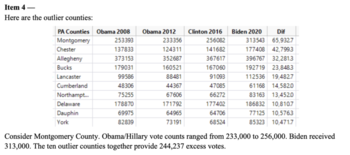
The lawsuit cites many examples in which election officials prevented poll-watchers from observing the counting of votes, as required by state law.
The lawsuit claims that Trump campaign observers were denied access altogether in some instances in Philadelphia County. The county’s elections board did not permit the Trump campaign’s observers to be within 6 feet of “all aspects” of the pre-canvassing process in violation of Commonwealth Court Judge Christine Fizzano Cannon’s November 5, 2020, order requiring that poll-watchers “be permitted to observe all aspects of the canvassing process within 6 feet.” The lawsuit states,
| “It is estimated that 680,770 ballots were processed by the Allegheny and Philadelphia County Boards of Elections when no observation was allowed.” |
Major cities[edit]
History[edit]
When Europeans settlers arrived in the early 17th century the area was inhabited by about 15,000 Indians; they belonged to three main tribal groups, the Delaware, Susquehanna, and Shawnee. The English, Dutch, and Swedes all sought to occupy the land, but the English won the wars and took control. Dutch trading posts were established first; in 1637 Swedes built Fort Christina, and in 1643, began the first permanent settlement, located at the mouth of the Schuylkill River. The Dutch seized New Sweden in 1655, only to lose it to the English in 1664. King Charles II gave it to William Penn to pay off debts; the Penn family were the proprietors (owners) until 1776, when they were overthrown by the patriots as part of the American Revolution.
Religious tolerance[edit]
The colony was founded and owned by William Penn, an English Quaker who wanted a place where Quakers and other denominations could worship freely without persecution. The first Colonial Legislative Act, the Great Law of Pennsylvania, December 7, 1682, mandated:"That no person ... who shall confess and acknowledge one Almighty God to be the Creator, Upholder and Ruler of the World ... shall in any case be molested or prejudiced for his, or her Conscientious persuasion or practice." [17]
Benjamin Franklin helped write Pennsylvania's 1776 Constitution. In Frame of Government, Chapter 2, Section 10, it states: "Each member of the legislature, before he takes his seat, shall make and subscribe the following declaration: 'I do believe in one God, the Creator and Governor of the Universe, the Rewarder of the good and Punisher of the wicked, and I do acknowledge the Scriptures of the Old and New Testament to be given by Divine Inspiration.'"
18th century[edit]
Quakers came to the Philadelphia area, where many became successful merchants, handling the long-distance trade to London and other parts of the British Empire. Pennsylvania attracted large numbers of Germans, including Lutherans and many smaller sects. They were farmers in the southeast. Scots-Irish (mostly Presbyterians) settled the frontier regions. Pennsylvania was the third largest colony by 1775, with 275,000 people (including a few thousand black slaves who worked mostly as house servants).
Philadelphia grew quickly into the largest city in colonial America and with 35,000 people in 1776 was the second largest city in the British Empire. The city's economy was based on growing agricultural wealth from prosperous inland farms which sent their surplus grains, cattle and horses for export. Entrepreneurs set up prosperous shipbuilding works on the Delaware River, and opened an iron industry. The Quaker merchants favored education and civic culture, creating a rich cultural and intellectual life that gave Philadelphia the nickname, "the Athens of America."
The Continental Congress met in Philadelphia from 1774 to 1783, with an interruption when the British occupied the city in 1777 and the government moved to Lancaster and York. The Declaration of Independence was signed there in 1776, the Liberty Bell is there, and the Continental Army spent the winter of 1777 at Valley Forge outside Philadelphia, where they suffered severe hardships for want of supplies.
Early national period[edit]
The American Constitution was written in Philadelphia in 1787. Pennsylvania was the 2nd State to join the Union on December 12, 1787 and the city was the national capital from 1790 to 1800. In 1790 the state adopted a more conservative state constitution; state capital was relocated in 1800 to Lancaster, and then to Harrisburg in 1812.
The population grew with high birth rates, and low death rates, but little immigration. Scotch Irish filled out the frontier. A strong sense of commitment to Jeffersonian Democracy and Jacksonian Democracy gave the Jeffersonian Republicans and (after 1830) the Democratsa strong position. The Whiskey Rebellion of 1794 saw western farmers angrily protest the federal tax on their most portable product. President Washington personally led an army against it, and the rebels immediately gave in. A new and more democratic state constitution was adopted in 1838.
Civil War Era[edit]
The antislavery movement flourished after Quaker originated the anti-slavery cause and freed their own slaves.
The need for Philadelphia to maintain access to the expanding interior and the West, both as markets and as sources of materials, such as coal and iron, to be sold and manufactured, led to aggressive state programs to improve the transportation system. The Philadelphia-Lancaster Turnpike, first in the nation, was completed in 1794; the state built hundreds of miles of canals; mules pulled boats loaded with commerce and passengers. The canal system was linked by the Allegheny Portage Railroad over the Allegheny mountains in 1835. Private enterprise built railroads that opened up the anthracitge coal region, which became the premier energy source for America by 1850. Philadelphia became an industrial city, famous for textiles, iron and steel, and railroad equipment along with commerce and shipbuilding. The world's first major oil wells were drilled near Titusville in 1859 and the northwestern part of the state became the center for Standard Oil and other companies.
Pennsylvania's only president, James Buchanan, proved a failure in allowing seven southern states to break away under his watch. During the war Gettysburg was the scene of the war's most decisive battle, July 1–3, 1863—and Pennsylvania furnished men and leaders, including generals George B. McClellan, Winfield S. Hancock, and George Meade and Adm. David D. Porter, for the Union army and navy. Philadelphia banker, Jay Cooke was the leading financier of the Civil War; he invented a sytstem of savings bonds that allowed ordinary people to help finance the war. Philadelphia continued as a financial leader in the nation until after 1870, when it was far overshadowed by New York.
Obama era election fraud[edit]
The city of Philadelphia has a majority of voters affiliated with the Democrat Party. As of November, 2008, there are 1,126,768 registered voters in Philadelphia. Of those, 880,684 are registered with the Democrat Party, and 147,074 are registered with the Republican Party.[18] Despite overwhelming evidence of voter suppression by New Black Panther Party members Minister King Samir Shabazz, Malik Zulu Sha-Bazz, and Jerry Jackson at a Philadelphia polling office, they were acquitted with minimal charges by the U.S. Department of Justice, then under Attorney General Eric Holder. Holder, when questioned about his rationale, said he didn't want to prosecute "my people" (thus implying that he holds bias against white voters and for minorities, and that attempts to bring justice to people who violated the Voting Rights Act is comparable to what happened to Blacks in Charleston during the Civil Rights era).[19]
In the 2012 presidential election, Republican polling inspectors were blocked from polling places in the Democrat-ruled city. Rob Gleason, chairman of the Pennsylvania Republican Party, stated, "This was a shameless attempt from the Obama campaign to suppress our legally appointed Republican poll watchers."[20] Barack Obama received 100% of the vote in 59 Philadelphia precincts with zero votes for Mitt Romney.[21] In Philadelphia, a mural of Obama at a polling place was covered up after a Republican voter took a picture of it.[22]
Miscellaneous[edit]
Pennsylvania is known as the "Keystone State". The name comes from its location between the northern and southern colonies; like the keystone holds an arch together.
Pennsylvania is the birthplace and home of President James Buchanan.
Pennsylvania was the only one of the 13 original colonies to be completely landlocked—it did not border an ocean.
The ruffled grouse is the state bird of Pennsylvania.
The white-tailed deer is the state animal of Pennsylvania.
Sports[edit]
Pennsylvania is home to the NBA's Philadelphia 76ers, the NHL's Philadelphia Flyers and Pittsburgh Penguins, Major League Baseball's Philadelphia Phillies and Pittsburgh Pirates, and the NFL's Pittsburgh Steelers and Philadelphia Eagles. Additionally, Pennsylvania State University is a traditional college football powerhouse, and Villanova University and the University of Pittsburgh have had great success in college basketball as of late.
Name[edit]
Pennsylvania was named by the king after William Penn's father (Penn himself did not want the name used.)[23] The name means "Penn's woods".
Further reading[edit]
- Miller, Randall M. and William A. Pencak, eds. Pennsylvania: A History of the Commonwealth (2002), detailed scholarly history
- Beers, Paul B. Pennsylvania Politics Today and Yesterday (1980), government textbook
- Klein, Philip S and Ari Hoogenboom. A History of Pennsylvania (1973), solid college textbook
- Weigley, Russell. Philadelphia: A 300-Year History (1982)
- WPA Federal Writers' Project. Pennsylvania: A Guide to the Keystone State, 1940.
See also[edit]
- Blue states
- Purple states - swing states that can vote either Republican or Democrat
- Johnstown flood tax
- William Scranton
External link[edit]
- 2020 election: Mail-In Ballot Math Doesn't Add Up for Biden
References[edit]
- ↑ https://www.breitbart.com/politics/2020/11/04/pennsylvania-republican-senators-call-on-pa-secretary-of-state-to-resign/
- ↑ https://www.bitchute.com/video/xUWA4CqzQ6pN/
- ↑ https://twitter.com/ZoeTillman/status/1324376367916605447
- ↑ https://www.breitbart.com/politics/2020/11/03/the-steal-is-on-in-pennsylvania-poll-watchers-denied-access-illegal-campaigning-at-polling-locations/
- ↑ https://www.lifesitenews.com/news/gop-poll-watchers-are-denied-access-in-philadelphia
- ↑ https://nationalfile.com/what-are-you-hiding-trump-campaign-says-philly-sheriff-wont-enforce-order-allowing-gop-observers/
- ↑ https://assets.documentcloud.org/documents/7325351/11-5-20-Trump-Campaign-v-Philadelphia-Board-of.pdf
- ↑ https://twitter.com/RaheemKassam/status/1325193658170134531
- ↑ https://thenationalpulse.com/politics/pennsylvania-vote-anomalies/
- ↑ https://theredelephants.com/there-is-undeniable-mathematical-evidence-the-election-is-being-stolen/
- ↑ https://www.heritage.org/crime-and-justice/commentary/what-know-about-litigation-being-waged-across-us-preserve-trump
- ↑ https://pjmedia.com/election/tyler-o-neil/2020/11/10/10-reasons-pennsylvanias-election-results-may-be-irredeemably-compromised-n1136044
- ↑ https://www.bitchute.com/video/o8Lcby3ivYWy/?list=subscriptions
- ↑ https://youtu.be/2AYSs77k2tY
- ↑ https://epochtimes.today/statistical-anomalies-in-biden-votes-analyses-indicate/
- ↑ file:///C:/Users/Owner/Downloads/483437334-PA-Voter-Analysis-Young.pdf
- ↑ http://www.docheritage.state.pa.us/documents/constitutiontrans.asp
- ↑ http://www.dos.state.pa.us/elections/cwp/view.asp?A=1310&Q=446974
- ↑ http://www.examiner.com/article/eric-holder-focus-on-black-panther-voter-intimidation-case-demeans-my-people
- ↑ Curry, C. & De Vogue, A. (2012, November 6). N.J. Extends Email Voting to Friday, Other States Hurry to Fix Polling Problems. ABC News.
- ↑ [1]
- ↑ Miller, J.R., Berger, J., & Weber, J. (2012, November 6). Philly poll workers partially cover Obama mural after court order, leaving logo and quote in view. FOX News.
- ↑ He wrote, "This day, my country was confirmed to me under the great seal of England, with privileges, by the name of Pennsylvania, a name the King would give it in honor of my father. I chose New Wales, being as this, a pretty, hilly country, but Penn being Welsh for head as in Penmanmoire, in Wales, and Penrith, in Cumberland, and Penn, in Buckinghamshire . . . called this Pennsylvania, which is the high or head woodlands; for I proposed, when the secretary, a Welshman, refused to have it called New Wales, Sylvania and they added Penn to it, and though I opposed it and went to the King to have it struck out and altered he said it was past . . nor could twenty guineas move the under-secretary to vary the name" See source
| |||||
Categories: [States of the United States] [Pennsylvania] [Purple States]
↧ Download as ZWI file | Last modified: 02/21/2023 05:26:30 | 219 views
☰ Source: https://www.conservapedia.com/Pennsylvania | License: CC BY-SA 3.0
 ZWI signed:
ZWI signed: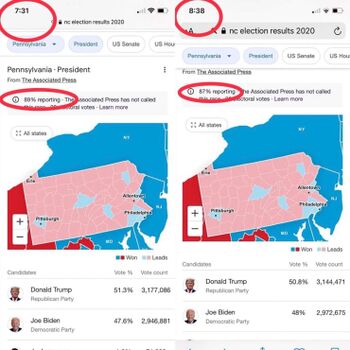
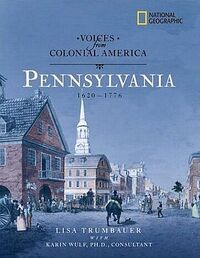
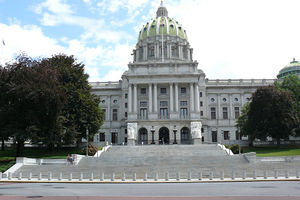
 KSF
KSF